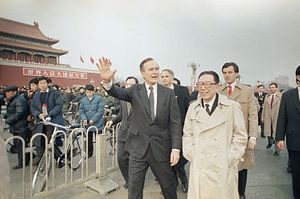I first met George Herbert Walker Bush outside the gates of the United States Liaison Office in Beijing in August 1974. I was waiting for a friend when the future president, who was then serving as chief of the liaison office and the unofficial ambassador for the United States in China, arrived at the gates riding a bicycle. His wife Barbara was with him. Bush asked the Chinese military guard to open the gate, and the three of us walked together to the liaison office. Our conversation, though brief, was casual, warm, and pleasant. Bush told me he enjoyed biking around Beijing and meeting Chinese people every day, and that doing so helped him learn about China and its people.
Bush was serving in an important post at a critical time. When offered the ambassadorship of his choice, he chose to head the liaison office in Beijing. The establishment of the liaison office had been one of the major victories for President Richard Nixon in his pursuit of closer ties with the United States. While not an official embassy, it allowed the United States to place diplomats in mainland China for the first time since 1945, and to begin re-establishing a rapport with their Chinese counterparts.
That Bush selected this liaison office, when he could have gone seemingly anywhere else in the world, demonstrates how highly he regarded China and the importance of U.S.-China relations even before he would rise to serve as vice president to Ronald Reagan and later as president. Bush would need all the knowledge he gained about China during his time as liaison chief, as well as his understanding of the importance of the bilateral relationship, when he occupied the White House during one of the most tumultuous times in modern U.S.-China relations.
George H.W. Bush was inaugurated as the 41st president of the United States in January 1989, just months before the violent Tiananmen Square crackdown shocked the world and led the U.S. Congress and American public to loudly call for a decisive cutback in U.S.-China relations. Bush heard these calls and understood this viewpoint, but was fundamentally and unwaveringly convinced that U.S.-China relations were important not just to the bilateral relationship but to stability in the Asia-Pacific region and around the globe.
He set about educating Congress to this view, and while defense ties between the United States and China were sharply reduced, Bush was instrumental in maintaining bilateral trade relations. While he would later pay the price for this politically, with then- presidential candidate Bill Clinton blasting him for not responding strongly enough to punish the “butchers of Beijing,” President Bush was resolute in his calculation that the preservation of U.S.-China relations was critical to global stability in a post-Cold War world.
George H.W. Bush will be remembered not just as a president, but as a great American who consistently devoted his life to serve the greater interests of the United States above his own. Chinese-Americans and Chinese too should remember him for his long friendship with China and his role in steering U.S.-China relations through one of their darkest and most difficult periods.
Dr. Chi Wang is President of the U.S.-China Policy Foundation and previously served as the head of the Chinese section at the Library of Congress.

































